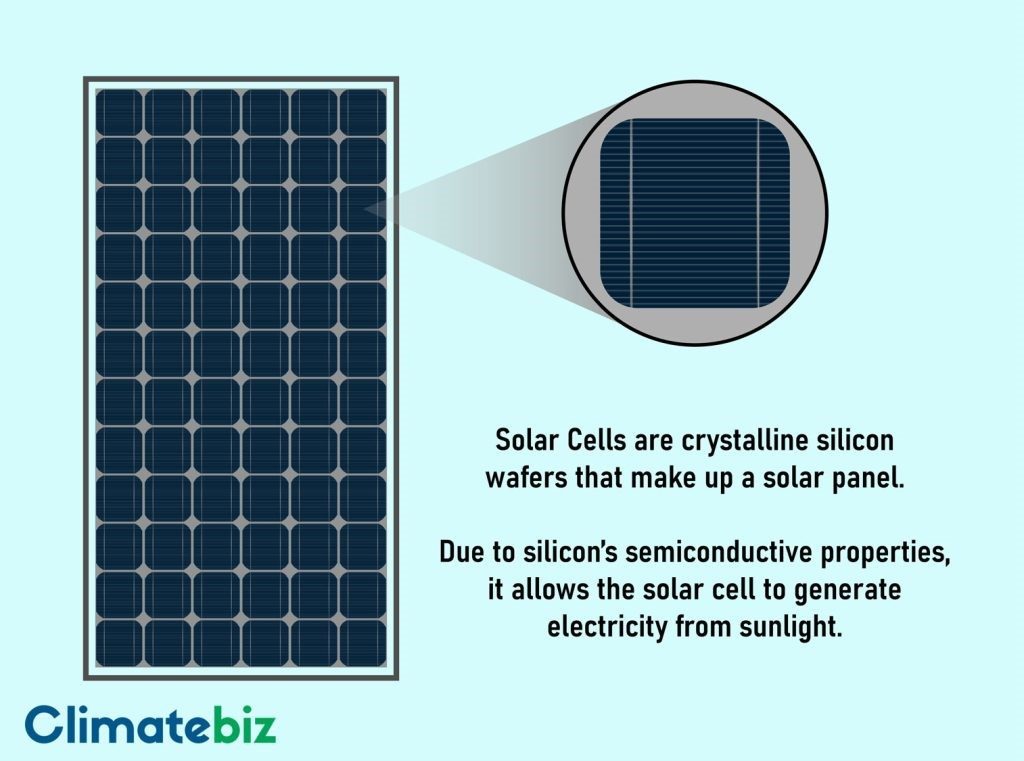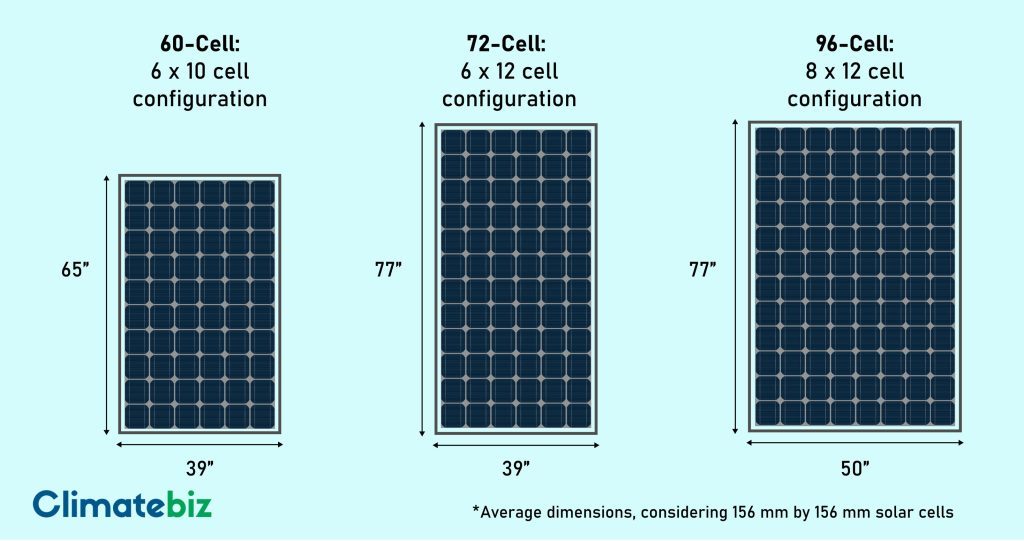Solar panels come in various configurations — from smaller, 36-cell thin-film solar panels to larger 72-cell monocrystalline offerings.
The latter has gained traction over the years, becoming one of the more popular panel sizes for residential solar applications.
As a homeowner looking to invest in solar, having numerous options at your fingertips is fantastic. However, it can also muddy the waters and make the investment process more challenging.
So, are 72-cell solar panels worth the investment?
In this article, we help you determine whether these panels are the right choice for you.
Table of Contents
What are 72-cell solar panels?
As the name implies, a 72-cell solar panel is simply a solar panel comprised of 72 individual energy conversion components.
Let’s take a closer look at the role and makeup of these cells.
What are solar cells?
If you look closely at a solar panel, you’ll notice it contains several individual square-shaped components. These square-shaped components are called solar cells.

A solar cell is a component responsible for absorbing sunlight and converting it into energy.
While the number of solar cells in a panel can influence the amount of energy it can produce, other key factors, such as cell efficiency, play an even greater role.
Although there are currently many different solar cell sizes, the standard size of a solar cell is 156 mm by 156 mm (approximately 6 inches long by 6 inches wide).

Source: cleanenergyreviews.info
The average size of a 72-Cell solar panel
A 72-cell solar panel is arranged in a 6 x 12-cell grid configuration, while the more common 60-cell solar panel follows a 6 x 10-cell design.
Knowing the grid configuration of a 72-cell solar panel and the
dimensions of a standard solar cell, we can determine the average sizes of a 72-cell solar panel: approximately 39 in wide x 77 in long (99 cm wide and 195 cm long).

Comparing solar panels: number of solar cells
Due to their smaller size, 60-cell panels are a more common choice for residential applications or in RVs and campervans. The power output of these panels ranges from 150W to 300W.
Therefore, a 72-cell solar panel could suit your situation better if you have the space and require more power. For reference, a 72-cell solar panel’s wattage usually ranges between 300W and 450W.
As for 96-cell solar panels, they are much larger, so they tend to generate a greater amount of power (between 400W to 500W of power).
Due to its large size and heavy weight, a 96-cell solar panel is not a practical option for residential applications. However, it’s highly effective for commercial applications like solar farms.
| Number of Cells in Solar Panel | Wattage Range | Average Dimensions |
|---|---|---|
| 60 cells | 200W to 300W | 65″ long and 39″ wide |
| 72 cells | 300W to 450W | 77″ long and 39″ wide |
| 96 cells | 400W to 550W | 77″ long and 50″ wide |
What about voltage and wattage?
Each standard solar cell produces around 0.5 volts. When linked in series, the panel’s total voltage equals the sum of each cell’s voltage.
Therefore, the open circuit voltage of a 72-cell solar panel is 36V:
Total Voltage (V) = 72 cells x 0.5 V = 36 V
Following the same logic, a 60-cell solar panel can produce up to 30 volts (open circuit voltage), so its nominal voltage is insufficient to charge a 24V battery efficiently.
Conversely, 72-cell solar panels are also known as “24V nominal solar panels” since their voltage is ideal for charging a 24V battery or two 12V batteries wired in series.
As for the amperage, it’s directly proportional to the size of the solar cells — that is, the area of the semiconductor. Therefore, larger solar cells tend to produce more amps than standard-sized cells.
In summary, the wattage of a solar panel is directly proportional to the number of solar cells (determines voltage) and the dimensions of the solar cells (determines amperage).
How much does a 72-Cell solar panel cost?
Our research has shown that prices can range between $380 and $600, with the average price being $490.
That said, the cost of a 72-cell solar panel can vary significantly and depends on factors such as:
- Installation cost
- Manufacturer/brand
- Technology (monocrystalline, polycrystalline, thin-film)
- Wattage
Depending on the size of your solar array, costs can add up quickly, so make sure to factor them into your budget when deciding whether or not to invest in 72-cell solar panels.
Pros and cons of 72-cell solar panels
As with all things in life, 72-cell solar panels come with their pros and cons.
Pros
- Capable of generating more electricity than standard 60-cell panels with the same efficiency levels.
- Great for larger properties or businesses.
- Require fewer panels than 60-cell modules to achieve the same energy output.
- Occasionally, the price per watt can be less than 60-cell solar panels.
- Cheaper to install on a large scale.
Cons
- Usually more expensive than 60-cells solar panels.
- Require more space for installation
- Transport and installation can be difficult due to their heavy weight.
- Not recommended for off-grid installations such as RVs and campervans.
- Their cumbersome nature can make them difficult to maneuver on a roof.
- Not efficient for small-scale systems.
Are 72-cell solar panels worth the investment?
Whether 72-cell solar panels are worthy investments depends on your individual needs and budget.
If you have enough space and need a system that can generate a large amount of energy, then 72-cell solar panels will make for a good investment.
However, a smaller panel — such as a 60-cell variant — may be a better option if you’re pressed for space and don’t require as much power. This applies to off-grid systems (RVs, campervans, etc.) and smaller houses.
It’s also worth remembering that other solar panels, such as half-cut cell solar panels, may be better suited to your needs.
So do your research and consider all your options before making a decision.
Are solar panels with more cells superior?
Generally speaking, solar panels with more cells are more efficient and can generate more electricity than those with fewer cells.
However, other, more significant factors play a role, such as:
- Cell size
- Cell type
- Efficiency
- Cost per watt
Ultimately, solar panels with more than 72 cells aren’t viable for residential use: they’re too large and too heavy for roof installation and cost more.
However, for large-scale/commercial applications, panels with more than 72 cells are usually a better option, as fewer modules are required to achieve the desired output.
Therefore, the overall cost of building larger solar arrays can be significantly smaller using solar panels with more cells.
Final thoughts
If you need to generate a large amount of energy and have enough space for installation, a 72-cell solar panel can be a great choice.
However, if you’re on a tight budget and/or your energy demand is not that high, a smaller and cheaper panel may be a better option.
We hope this article has helped you make an informed decision as to whether 72-cell solar panels are the right choice for you.
If you have any questions about the subject, reach out to us in the comment section below or follow us on Twitter.

